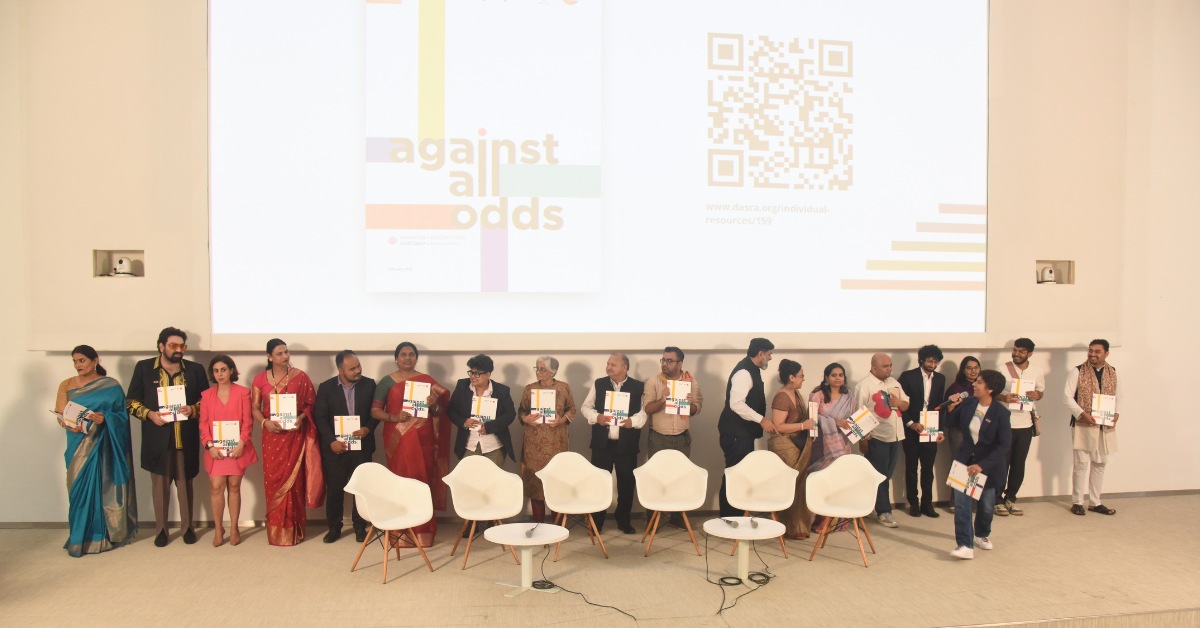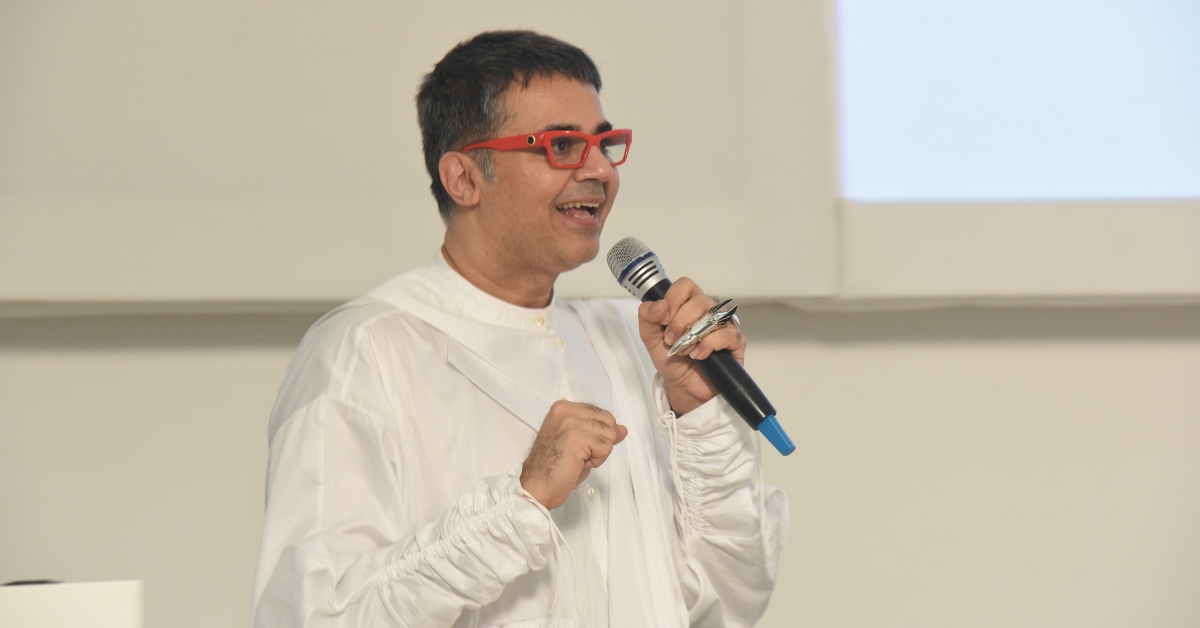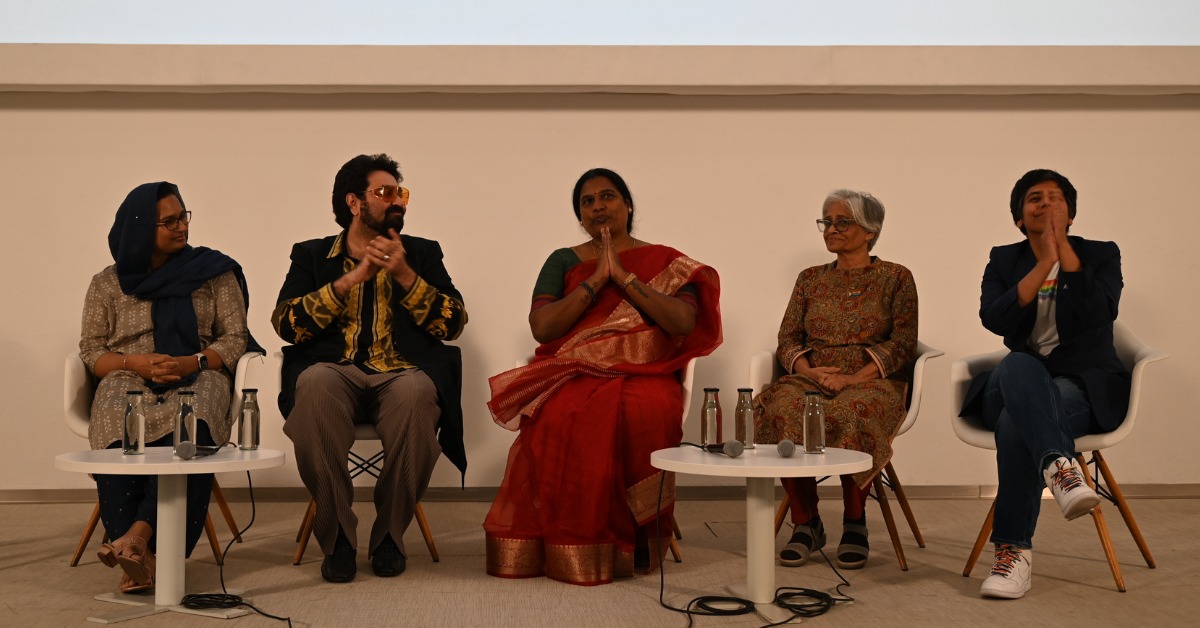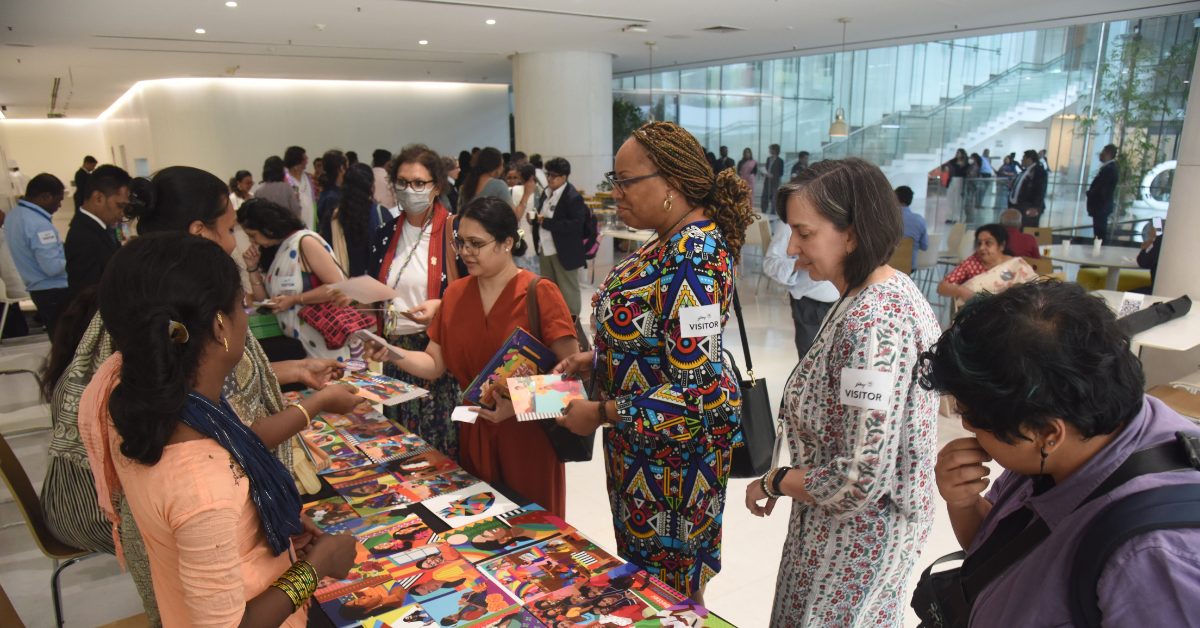Earlier this month in Mumbai, a landmark moment unfolded as queer leaders, corporate trailblazers, and philanthropists gathered to confront one of the most urgent crises facing India’s LGBTQIA+ community: the chronic underfunding of essential queer initiatives.
In an unprecedented act of solidarity, Godrej Industries Group and The Keshav Suri Foundation, along with Radhika Piramal (Vice Chairperson of VIP Industries and Trustee at Dasra), in her personal capacity, launched the Pride Fund. This groundbreaking initiative directly challenges a stark reality: despite India being home to an estimated 140 million LGBTQIA+ individuals, the country receives less than 1% of global funding for queer causes.

With an initial investment of Rs 2 crore and a clear commitment to scaling annually, the Pride Fund sets out to revolutionise support for LGBTQIA+ advocacy by providing flexible, multi-year financial backing to NGOs focused on critical areas like rights, safety, employment, healthcare, and legal aid. But it doesn’t stop there.
The Pride Fund also seeks to redefine the relationship between corporate philanthropy and grassroots activism, ensuring that queer-led initiatives are not just supported, but empowered with the sustainable resources needed to drive lasting change.
Godrej’s commitment: turning hope into action for LGBTQIA+ rights
The launch of the Pride Fund is not just a response—it’s the result of a deep sense of urgency that can no longer be ignored. A sense of urgency was shared by the fund anchors, who together took the bold step to address the glaring gap in funding for grassroots queer initiatives in India.
The motivation behind the fund? A growing awareness of the sluggish pace of legislative and social change in India, compounded by the lack of corporate funding reaching the very organisations that are fighting for the rights of the LGBTQIA+ community at the grassroots level.
Commenting on the launch, Parmesh Shahani, Head of the Godrej DEI Lab, highlighted the Pride Fund’s pioneering role in India: “The Pride Fund marks a historic milestone — it is a first-of-its-kind initiative in India, created by queer community members for the community.
This fund reflects our shared vision of equity and inclusion by directly tackling the systemic barriers that have long marginalised LGBTQIA+ individuals. With only 27% of NGOs serving the community having a national presence, we aim to empower these communities by providing targeted support and resources.”
“Our goal is to ensure access to safety, health, justice, and opportunities that have been denied to them for far too long.” He added, “By addressing these pressing needs, we hope to create a ripple effect that leads to a more inclusive and equitable society — one that truly embodies the spirit of a Viksit Bharat, where every individual, regardless of their identity, can thrive with dignity and pride.”
Radhika Piramal, who identifies as a lesbian and married her wife, Amanda, in London, reflected on the painful impact of the Supreme Court’s October 2023 ruling against marriage equality.
“Where else do we go but back to the people?” she said at the launch event, held at the Godrej One headquarters.
She added, “I cannot legally register my marriage with my wife in India. That reality is deeply unfair, and while the legal battle continues, we must do more now to uplift the community, especially those facing discrimination, violence, and exclusion at multiple levels.”

Keshav Suri— an openly gay hospitality leader who has trained thousands of queer individuals in the hospitality, retail, and finance sectors — emphasised the need for long-term financial commitment.
“We don’t just need allies; we need accomplices. It’s not enough to say you support LGBTQIA+ rights — funding and action must follow words,” he said.
Parmesh also emphasised the fund’s deliberate focus in its inaugural year. “We intentionally wanted to support queer-led NGOs working at the grassroots level in smaller towns and cities — places that often lack exposure, access to resources, and large-scale funding. The goal was to prioritise organisations that are led by queer individuals who are deeply embedded in their local communities.”
The stark reality: ‘Against All Odds’ report
Alongside the launch, the founders also released ‘Against All Odds’ — a comprehensive report mapping the funding landscape for LGBTQIA+ organisations in India.
The findings were stark:
- India receives less than 1% of global funding for LGBTQIA+ issues, despite having an estimated 140 million queer individuals.
- Only two of India’s top 50 philanthropists explicitly support LGBTQIA+ causes.
- Over half of queer non-profits operate with annual budgets below Rs 50 lakh, making it difficult for them to scale their impact.
- International donors contribute 59% of funding to LGBTQIA+ organisations in India, making domestic funding critical for long-term sustainability.
- 53% of LGBTQIA+ non-profits operate at a hyperlocal level, addressing specific community needs but struggling to access mainstream funding.

“For years, Indian companies have spent crores on weddings and lavish celebrations. It’s time they invest in ensuring queer people can access the same basic rights and dignities,” said Piramal.
Focus on grassroots & systemic change
In its first phase, the Pride Fund will provide financial support to eight queer-led organisations chosen through a rigorous selection process. These groups work at the intersection of gender, sexuality, healthcare, livelihoods, and social justice:
- Basera Samajik Sansthan (Noida) — Supporting HIV-positive individuals and vulnerable groups, including sex workers, MSM (men who have sex with men), and transgender persons.
- Deepshikha Samiti (Delhi) — Helping people with HIV/AIDS find employment and participate in governance.
- Vikalp Women’s Group (Vadodara) – Working for the rights of marginalised women and gender/sexual minorities in rural, tribal areas.
- Sappho for Equality (Kolkata) — Fighting for the rights and social justice of individuals with non-normative gender-sexual orientations and identities.
- Karna Subarna Welfare Society (Murshidabad) — Building resilience within the LGBTQIA+ community and generating sustainable livelihoods.
- Ya_All: The Youth Network (Manipur) — A queer, youth-led organisation working on mental health, sexual health, and economic inclusion.
- Chhattisgarh Mitwa Sankalp Samiti (Chhattisgarh) — Focused on the development and mobilisation of the transgender community.
- Payana (Bengaluru) — Providing advocacy services and support to local sexual minority communities.
“Our goal is not just to give grants but to create a long-term funding ecosystem,” said Parmesh, who identifies as gay, and has long advocated for workplace inclusivity.
A call for corporates and philanthropists to step up
The fund’s organisers are urging businesses, high-net-worth individuals, and corporate CSR initiatives to commit to sustained funding for LGBTQIA+ causes. To attract diverse funders, they have created three tiers of donation categories:
- Catalyst (Rs 25-50 lakh)
- Illuminator (Rs 50 lakh+)
- Beacon Circle (Rs 5 crore+)
“Today, one of the biggest challenges is that the critical connection — between the largest corporations and the neediest NGOs — doesn’t exist. Big, well-known LGBTQIA+ organisations do get funding and resources, but if you want to ensure that your corporate money is reaching the most underfunded places, this fund is a bridge to see that happen,” said Saurabh Kirpal, a senior advocate and LGBTQIA+ rights crusader who was among the planners behind the Pride Fund.
A new chapter in queer philanthropy
For India’s queer communities, the Pride Fund goes beyond providing financial support. It symbolises a long-awaited acknowledgement of their strength, a critical step toward sustainable change, and an opportunity to redefine the landscape of philanthropy with a focus on true equity.
For many grassroots organisations, the Pride Fund arrived at a crucial time when hope was fading. As Sadam Hanjabam, a representative from Ya_All, shared with a strong sense of emotion, “Our organisation was about to shut down the very month we learnt about the fund.” He continued, “Being an organisation dedicated to and created by young people, we often face judgment for not being considered mature enough. This fund will be a lifeline for our sustainability.”

For others, the fund offers a sense of new possibility in a landscape where the challenges are real and relentless. Vidya Rajput, a representative from Chhattisgarh Mitwa Sankalp Samiti, spoke of the deep struggles her community faces, saying, “This fund will help our people access laser treatments which usually cost a lot of money. It’s something we have really struggled with. We’ve been fighting for funds, and now that US funds have also been halted, we are extremely stressed. I hope the fund doubles from next year onwards.”
Backed by Godrej, the Pride Fund is laying the foundation for an India where every queer individual has the support, resources, and opportunities they deserve.
This article is published in partnership with Godrej Industries Group.
Edited by Leila Badyari Castelino
